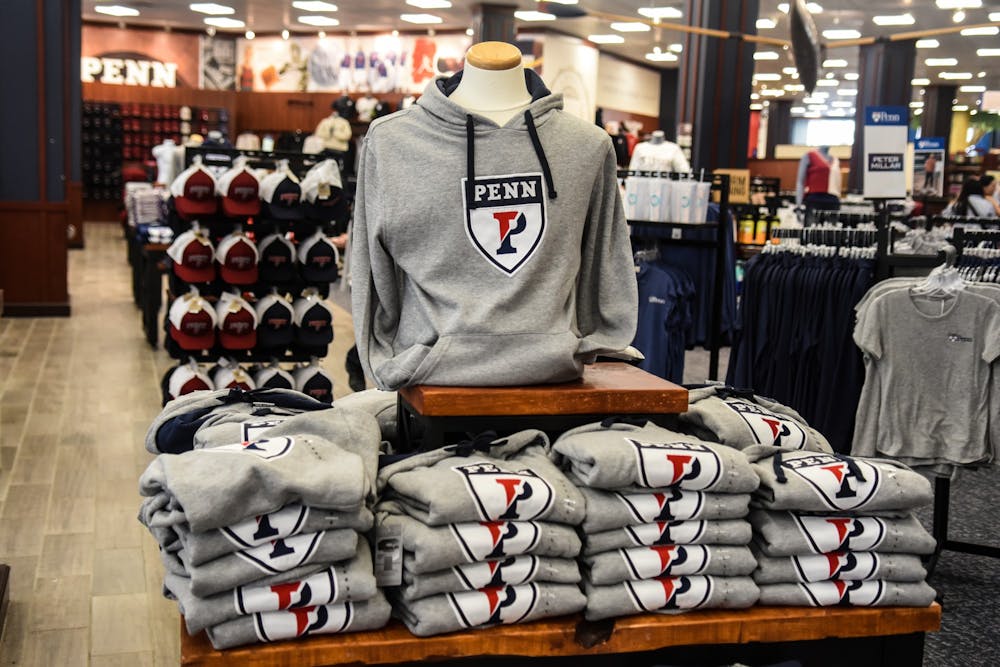As an exchange student from the UK, something that American students often mention to me, especially those who have visited Europe, is how impressed they are with our (or their, post-Brexit?) sense of style. We dress so much more fashionably, I’m told, with such a stronger sense of individuality — though they never say this about my style, which I’m attempting not to take personally. This wasn’t something I instantly noticed upon coming here: Europeans hardly dress for the runway, but we don’t exactly turn up to lectures in our pyjamas either. An interesting difference that I have picked up on, though, is that European students wear far less university, club, and employer merch. That small distinction is representative of a significant cultural gap.
One of the key features I’ve found of the Penn experience is how deeply it’s centred around finding a sense of belonging. Much of our identity is founded upon the things we’re a part of: Greek life, clubs such as the Daily Pennsylvanian, down even to the sense of pride we have in being at Penn in itself. I have been absolutely swept up in it. Half of my wardrobe is now branded merch, and I will unashamedly admit to having bought P-sweaters in both colourways. Walking Locust on any given day, a significant portion of the outfits you come across are emblazoned with university, sports team, social organisation and college house logos. We aim to convey who we are through our outfits and, by extension, our social circles and the list of commitments displayed on our LinkedIn profiles.
I’m not meaning to criticise anyone for this — we have every right to take pride in the groups we choose to invest our time in. The more engaged and better-funded nature of clubs at Penn means that generally they are a bigger part of our lives compared to clubs in Europe. But this feeling of belonging is also partly manufactured by the validation and exclusivity of the cutthroat recruitment process, which was initially very blindsiding to me. At home, you just turn up to a GBM and you’re in. The culture that creates for both our relationships with our peers and our personal perceptions can turn worryingly toxic.
Meeting people socially here is often prefaced by a list of the things they’re involved in. There’s an instinctive desire, conscious or not, to judge people’s social standing based on how “cool” their frat or sorority is, the “clout” their clubs have, and so on and so forth. This factors into our future careers, too: I’ve seen the demeanour of people entirely change mid-conversation when a friend casually drops in their job offer at some big-shot investment bank or consulting firm (you know exactly which ones I mean).
What this generates is a culture of extremely superficial and transactional views of who people are. Students here, it seems to me, tend to care more about an acquaintance as a networking opportunity or an “in” to a party than someone whose well-being they are genuinely interested in. Maybe I’m not being cynical enough and being too critical of Penn in believing that classmate and colleague relationships are ever built around more than that — though the phenomenon is stronger here, it exists at home, too. Nonetheless, I’ve never felt that sense of objectification more than since coming here.
This also translates into our senses of selves and how we display them. The obsession with getting into these in-groups can mean that we don’t spend enough time forging an identity outside of them. Coming into the latter stages of junior year, I’ve found several friends going through an identity crisis of sorts: though they’re constantly busy with academia and extracurriculars, they don’t feel like they have any unique hobbies beyond campus and pre-professional life. While those things are important, forging who we are wholly based on others’ validation is an extremely unhealthy way to live. Our personal style has become a display of commitments that others care about, rather than interests that we value. Maybe Europeans’ decreased emphasis on that is what makes their fashion sense seem so much more defined and individual.
Our clubs and future careers may make us interesting to others, but they’re very unlikely to make us unique. I’m not saying that Europeans are free from falling into that trap: I have plenty of friends at home who have high positions in similar clubs and graduate jobs at the exact same firms. But unlike here, that isn’t the first thing you notice upon meeting them. If their outfits are anything to go by, anyway, they may be closer to moving beyond it. Our personal and social identities should not be founded on a generic laundry list of commitments. We are all genuine, individual personalities. That is what we should aim to express.

SEE MORE FROM ALEX BAXTER:
Patagonia privilege: The on-campus housing rip-off
"Students First, Adults Second": The difficulties of outgrowing the Penn bubble
ALEX BAXTER is a junior on exchange from the University of Edinburgh studying politics, philosophy, and economics in the College. His email is ajgb@sas.upenn.edu.









